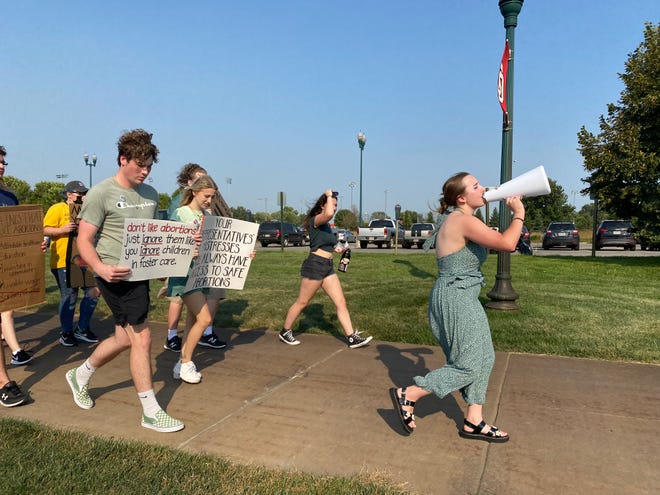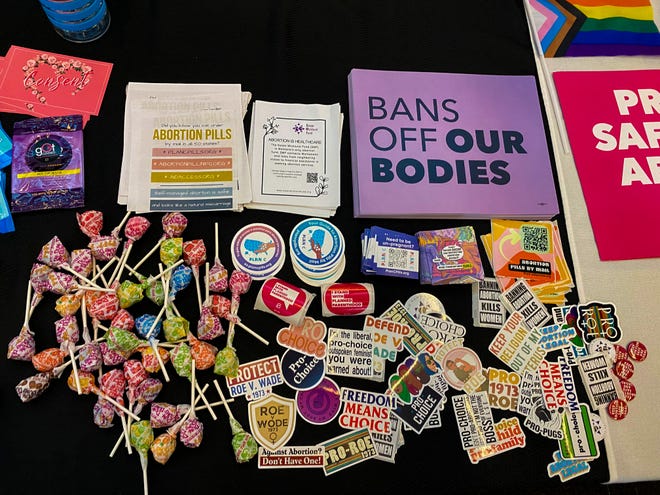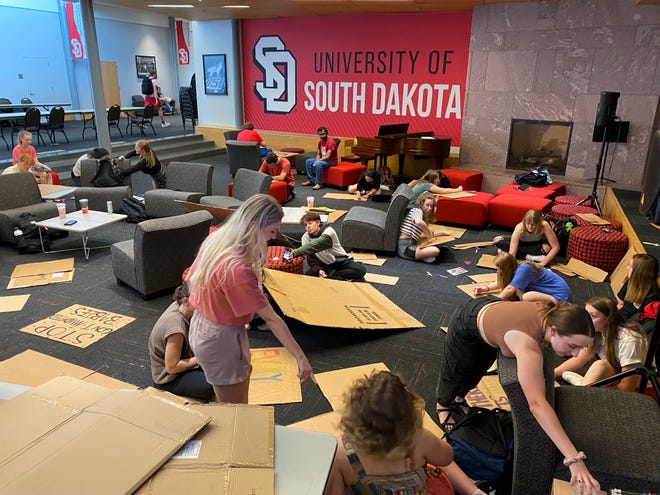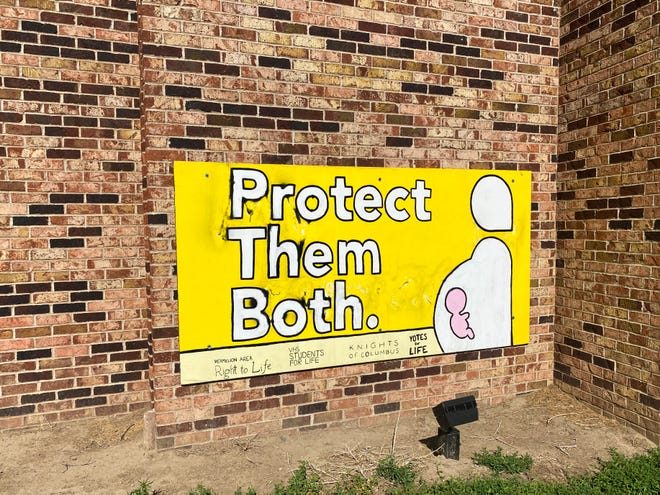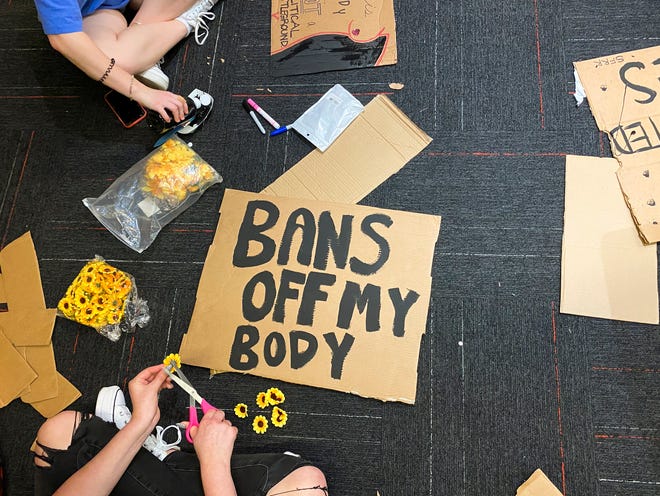VERMILLION, S.D. — The students looked as if they could be getting ready for a Harry Styles concert, sprawled out across the carpet in the University of South Dakota’s student center. Early 2000s pop music flowed as they spent the evening hunched over poster boards and deconstructed cardboard boxes, chatting, shaking paint pens and passing around bags of plastic gemstones and faux flowers.
A closer look through the rhinestones and bright paint revealed fury, not fandom. Their signs read, “You cut off my reproductive rights, should we cut off yours?” and “The hardest decision a person can make isn’t yours.”
Preparing for a march across campus to protest the recent Supreme Court decision that triggered a near-total abortion ban in their state, the students encouraged one another to avoid the use of gendered language for people who get abortions and think carefully before using images like clothes hangers on their signs.
While they worked, Lexi McKee-Hemenway — wearing cargo pants, a tank top and sparkly silver eye shadow — made her way through the group with a spiral notebook, seeking fellow students who wanted to take leadership roles in the university’s Students for Reproductive Rights group, which she said has roughly doubled in size to 30 members since last year.
McKee-Hemenway, the group’s president, is among college students across the country who are frantically advocating for changes in policy and laws to make abortion legal again, while also trying to help those who may need an abortion in the meantime. Working on both goals at the same time can be daunting.
“That’s all very scary, it’s very dystopian,” McKee-Hemenway said. “There are still resources, and there are people that will help them get those resources. It is hard, but we will make it happen.”
South Dakota is one of 14 states that have banned abortions with few exceptions as of late September; like South Dakota, most had “trigger laws” designed to take effect once the Supreme Court overturned Roe v. Wade. A number of other states’ bans are still being contested in state courts.
South Dakota’s law, passed in 2005, is among the most rigid in the country, prohibiting abortion procedures, abortion pill prescriptions even by telemedicine and allowing no exceptions for pregnancies caused by rape or incest. Since then, two attempts to ban abortion by amending the state constitution have been made; both failed, but about 45 percent of voters supported them.
Many of the states that ban abortion, including South Dakota, also do not mandate that public school students receive sex education. When sex education is offered in South Dakota, it’s not required to be medically accurate or include information on consent.
MAINTAINING STUDENT ABORTION ACCESS:How are college campuses preparing for a post-Roe world?
Kate Cartagena, the director of youth campaigns at Planned Parenthood, said without sex education, young people “don’t even know all the things they need to know about how to control their own bodies.”
Planned Parenthood’s Generation Action program supports more than 350 high school and college advocacy groups, including the Students for Reproductive Rights at the University of South Dakota, which with 7,000 undergraduates is the state’s second-largest college after South Dakota State.
Generation Action encourages students to work not only for abortion access, but for local needs like travel funds for students choosing abortions and flexible attendance policies so that students are not penalized academically if they need to miss class for abortion care.
Though the university group receives guidance and resources from the larger organization of Planned Parenthood, the students and their two faculty advisers said that on campus they operate mostly on their own.
McKee-Hemenway has long been passionate about abortion rights, but when she saw the alert on her phone about the overturning of Roe v. Wade, she said it felt as if the world were falling apart.
“I’ve tried not to make politics my entire life, but now it’s more of a moral thing,” McKee-Hemenway said.
Across the country, students and professionals alike had been preparing for the Supreme Court decision. When it was leaked in May, Advocates for Youth was five weeks into an abortion doula training for young people across the country who hoped to be able to support their peers before, during and after an abortion. And URGE, which stands for Unite for Reproductive and Gender Equity, helps student groups nationwide learn to advocate for themselves in their state legislatures.
Colleges in states where abortion is now illegal have found themselves in a complicated situation, in part because many rely on state legislatures for funding. Some have chosen to remain silent, while others, like the University of Idaho, have instructed faculty to speak of abortion only neutrally and have stopped offering birth control to students to avoid breaking the law.
President Joe Biden and Education Secretary Miguel Cardona have urged colleges to maintain access to birth control.
“I want to be clear with college leaders in America, access to contraception should not be in question, and access to health care, including reproductive health care, is critical to the wellbeing and success of our nation’s students,” Cardona said Tuesday.
In South Dakota, any person who prescribes, administers or procures an abortion is guilty of a felony, punishable by up to two years in prison or a fine of up to $4,000, or both, according to the state legislature. The only exception is for an “appropriate and reasonable” medical judgment that an abortion is necessary to save the life of the mother.
Advocates like McKee-Hemenway say the law leaves medical providers with little definition of what qualifies as risk to the life of a pregnant woman. And it leaves people like her uncertain of exactly what they can do to help peers who need abortion care.
Their options are limited.
A student who is less than 11 weeks pregnant can get a medication abortion at the Planned Parenthood clinic in Sioux City, Iowa, which is about 40 miles from campus. To receive a procedural abortion, allowed by Nebraska state law through 16 weeks and six days, a student would have to travel nearly 140 miles to the Planned Parenthood clinic in Omaha, Nebraska.
Going out of state to receive an abortion is legal, but difficult for students without cars or financial resources. For example, to get from Vermillion to Omaha would take about two hours by car, and far longer by public transit, requiring multiple transfers and some walking.
Other students on campus believe these aren’t the only options. The university’s pro-life student group works to counsel those who are pregnant to get early-term care at nearby crisis pregnancy centers, and to continue with the pregnancy.
OB-GYN TRAINING AT RISK:Overturning Roe created new barriers, not just to abortion
For those who seek abortions, it’s still unclear whether the university will provide help.
The school hasn’t issued a statement on the restriction on abortion access since the Supreme Court decision in late June. Representatives from the university did not respond to repeated requests for comment for this story.
The silence frustrates McKee-Hemenway, a junior who hopes to graduate early, at the end of this academic year. At the very least, she said, the university should have told students: “ ‘Hey, some basic health care isn’t going to be extended to you here. You will have to leave the state on your own time, with your own money.’ ”
And while she’s from South Dakota, many of her peers come from states where abortion is still legal.
When Minnesota native Rosamaria Rodriguez learned the Supreme Court decision would change her rights in South Dakota, she began to second-guess her college decision.
“I liked the campus and the people seemed like they would be a good fit, but I don’t know if I really wanted to spend my college years in a place where they can’t even respect what I want to do with my own body,” Rodriguez said.
Ultimately, she decided to stick with her choice, because she wants to be a doctor and believes this university is best for her academically. She moved to Vermillion in mid-August as a freshman, and soon joined the Students for Reproductive Rights group.
Along with marching and chalking slogans on campus sidewalks, group members also spend time in the student center each week passing out flyers and answering questions, trying to make sure students know which hotlines and abortion funds can help them coordinate and cover costs for travel and lodging if they need to go to another state to obtain an abortion. They also share information about how to self-manage an abortion with pills that can be ordered online, even if state law prohibits it.
Related: If we see more pregnant students post-Roe, are we prepared to support them?
COULD DROPOUTS RISE:If more students become pregnant post-Roe, are we prepared to support them?
“Right now, options are very limited,” McKee-Hemenway said. “It is better to be aware of where you can go if you do need it.”
McKee-Hemenway, 20, grew up about six hours northwest of Vermillion, in Sturgis, South Dakota, a small city of fewer than 7,000 people today. Her mother, Katy Hemenway, said she has always been pro-choice, and began talking to her daughter about reproductive health when she was in middle school. As Lexi got older and started having friends who needed birth control or the morning-after pill, she knew she could turn to her mother for information if they asked her for help.
As she was learning about real-life resources that could help prevent teen pregnancies, she was also on the speech and debate team, learning to pick apart complicated, controversial issues. She started in 2015 as an eighth grader, a year earlier than most students, taking the bus to a local high school on Wednesday afternoons to participate.
The team debated everything from standardized testing to child labor to carbon emissions taxes, and McKee-Hemenway said abortion came up every year. More often than not, she found her view on abortion to be a minority opinion. At the University of South Dakota, she’s found kindred spirits, and feels less like the “black sheep” than she did growing up in Sturgis.
For McKee-Hemenway, an abortion decision is very personal, but even in general terms, the topic can be difficult to discuss. She said she found herself in tears after a recent event discussing the implications of the Supreme Court decision for South Dakotans, as she thought about the challenges people now face in seeking abortion care. Staging protests and hosting events help boost morale among tired and busy student advocates, she said.
“It can be really hard to keep the fire lit for a super long time,” McKee-Hemenway said. When they have events, they can reignite the conversation on campus.
Students for Reproductive Rights also collects menstrual hygiene products to donate to local shelters and schools, offers sex trivia contests on campus to raise money, and tries to help educate other students about reproductive health.
Anna Bottesini, a sophomore, will take over as the president of Students for Reproductive Rights after McKee-Hemenway graduates next spring. When she learned of the Supreme Court’s decision to overturn Roe, she said, “it was like a punch to the stomach.”
She said there have been many new faces in the group this fall, and to her, it makes sense that this major policy shift would drive concerned students her group’s way.
BEATING THE ODDS:How parents of young kids make it through college
“There’s a lot of people who are just worried, in general, like, ‘What if my birth control fails? What do I do? What happens then? Because I can’t — I’m a broke college student and how can I afford to, like, go and do this?’ ” Bottesini said. “There are a lot of people who are upset about it and just don’t know what to do.”
But the student body also has a contingent that believes abortion is wrong and is pleased with the Supreme Court decision and the subsequent tightening of laws in South Dakota.
The student anti-abortion group, named Yotes for Life after the school’s coyote mascot, meets just off campus at the St. Thomas More Newman Center. Though the building is a hub for Catholic students, the group’s president, Gavin Holt, said members do not need to identify as Catholic to participate.
Standing in front of a large projector screen for his presentation welcoming new and returning members, Holt wore a royal blue T-shirt that read “Remember the Unborn” across the back, the slogan of a group called Life Runners. He is also president of the local chapter of that group, which is religious and which he said is not affiliated with the university, though it meets in the same location directly after the student group meets, and with many of the same students.
Holt, a sophomore, is Catholic, but avoids using the church’s teachings when arguing his view on the issue. At Yotes for Life’s first meeting of the year, he explained the logic behind the group’s stance: Life is a human right; abortion takes a life; therefore, abortion is a violation of human rights.
Holt said the group aims to share that view of abortion and provide women with access to resources offered at local crisis pregnancy centers. At the meeting, Holt and fellow student leaders tallied up those who might be interested in volunteering at three such centers nearby. These organizations typically offer pregnancy tests, ultrasound scans, pregnancy information and counseling against abortion.
Like Students for Reproductive Rights, Holt’s group spreads its message via sidewalk chalk across campus. Instead of using catchy slogans, Holt urged members to stick with helpful phone numbers and resources. The two groups fundamentally disagree, but both say they generally try to avoid antagonizing each other.
“I don’t agree with them, but I don’t think they are, like, ill-willed,” Holt said. He also said his group would not stage a counter-protest to McKee-Hemenway’s, because he did not think it was right to “ambush” another group.
One afternoon early in the semester, Students for Reproductive Rights and supporters from across campus gathered outside the athletic center, under the late summer sun. They passed around little leaflets printed with chants and offered to share sunscreen.
It was 95 degrees as they began their march across campus. Some students carried the signs they’d made two nights before, though about 50 showed up to march — many more than had attended the sign-making session. McKee-Hemenway, carrying only an acoustic megaphone, led them in chants.
ABORTION BATTLE LINGERS:Supreme Court to grapple with race, elections in new term
When they arrived at the campus’s main academic quad, McKee-Hemenway and the leaders of the College Democrats and the university’s LGBTQ+ student alliance climbed to the top of a set of stairs to speak from a balcony. The three told the students that they weren’t alone in their fight toward legalizing abortion care in South Dakota.
Some hope that abortion can be legalized in South Dakota via a ballot initiative, which shifts the power from lawmakers to voters. This tactic was recently successful in Kansas, where 59 percent of voters voted to keep abortion legal, and will soon be tested in Michigan, Montana, Kentucky, California and Vermont.
The ballot initiative effort involves a lengthy approval process with the state and the collection of thousands of signatures, so it wouldn’t likely go to the voters soon.
More immediately, students are encouraging one another to update their voter registration and prepare to vote this November. The Republican governor is up for re-election, and all 105 state legislative seats are on the ballot.
For now, though, abortion is illegal in South Dakota, and the students have no insight about whether, if they sought abortion care, the college would help them or report them to law enforcement. For now, their best bet is to help one another.
At the protest, McKee-Hemenway and the others urged their peers not to give up in their fight for bodily autonomy and the right to access a safe abortion.
“Look around,” McKee-Hemenway said to the crowd. “These are the people in your corner. This is your mutual aid now.”
This story about student activism was produced by The Hechinger Report, a nonprofit, independent news organization focused on inequality and innovation in education.



